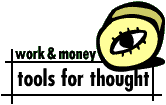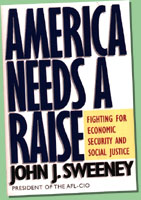
Title: America Needs a Raise:
Fighting for Economic Security and Social Justice
Authors: John J. Sweeney with David Kusnet
Year: 1996
Publisher: Houghton Mifflin
Price: $18.95 US
Review by: Catherine Hedgecock



Title: America Needs a Raise:
|

 |
There's an underdog spirit about John J. Sweeney you can't help but admire. Sweeney, president of the AFL-CIO, is the quintessential regular guy. He cares about working people. He believes in unions. He thinks all Americans should have fair wages and decent benefits, no matter what their job. Sweeney's heart is in the right place, but his solutions to the country's financial ills sound worn and thin.In this readable, at times uplifting book, Sweeney recalls his boyhood in the labor-strong Bronx, where Irish labor leaders faced down powerful businessmen and the union was a pillar of life (along with family and the Catholic church). The community stood together through hard times and prosperity, and the union made that cohesion possible. You understand Sweeney's pro-unionism from reading about his past. But you also get the feeling that he is living in the past. Sweeney sounds like a left-wing Bob Dole when he talks about the good old days when unions were strong and everyone worked together toward the American consumer dream. Sweeney is right on about the inequality and inhumanity that passes for normal work life for millions of Americans. Unfortunately, his solution is one-dimensional: bring back the unions. He directs his ire at "corporate America," the amorphous villain oppressing the courageous, downtrodden workers. Such melodramatic positioning of the good unions vs. the evil corporations undermines the power of this book.

"Human dignity demands that workers have a voice on the job, and the papal encyclicals we studied recognized the role of unions. Several priests and teaching brothers, particularly Father Philip Carey, of the Xavier Labor School, taught me a lesson I try never to forget: a union must be a movement and a mission, not a business or a bureaucracy. In particular, they taught that organizing new members is not only an institutional necessity but an ethical imperative. It is a practical example of the fortunate helping their less fortunate sisters and brothers."
(p. 14)"Of course, business and government shouldn't shoulder all the blame for the decline in working people's living standards. We in the labor movement are also partly at fault because, over the past few decades, we let our guard down. Too many unions became complacent, and the best evidence of that is the decline in labor's organizing effort."
(pp. 84)

This is a feel-good book. From it, you'll get a strong sense that unions are important, that working people matter, that there's something terribly wrong with a nation where executives earn millions of dollars to put thousands of people out of work. Yes, there is something wrong, morally, humanely and financially. Greed is rampant and inequity a fact of life. I agree with Sweeney that it's getting worse, not better. Are unions the answer? Maybe, but not if they keep dipping into their old bag of tricks. Unions have to change with the times before their leaders can point fingers at anyone else. Sweeney acknowledges, for example, that women and minorities did not start gaining top policy positions with the AFL-CIO until the 1980s.Sweeney admits he still sees unions' primary role as being contract negotiators and enforcers. But he acknowledges that unions need to be more like consultants and training firms, helping workers better themselves individually. Sometimes unions must organize boycotts and strikes, but their leaders can't be one-slogan podium-pounders anymore. Among the most interesting parts of Sweeney's book are accounts of new, non-traditional organizing. For example, clerical workers at Harvard University organized using a person-to-person campaign, without attacks on management. They formed an independent union in a loose affiliation with a white-collar union. A key part of their philosophy has been to work with management as partners, not as adversaries.
If Sweeney's dream of a prosperous, empowered workforce is to come true, unions must stay in touch with workers' needs in a rapidly changing workplace and learn to change with it. Save the brass knuckles for the greedy corporate raiders who deserve them and learn to use new tools that are essential to building a future for working Americans. We can only hope that Sweeney's vision, as laid out in his book, will lead unions to change themselves so that they can once again help to improve the workplace.
N.B. "America Needs a Raise" is available on the Web in hardcover from amazon.com.
Have you read this book? How many wrenches would you give it? (The more wrenches, the better a "tool for thought" it is.)
Tripod members give this book 2.4 wrenches so far.
You can also read and rate more of Tripod's Tools for Thought.
Map | Search | Help | Send Us Comments